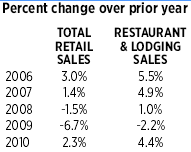I am often asked, “Can’t you say something nice about the economy? Isn’t there some good news out there?” OK, here is some good news — tourism is leading Maine out of the Great Recession!
Putting aside the hornet’s nest of what exactly is tourism — that’s a subject for another column — it is interesting to compare the last few years’ rates of growth of total taxable retail sales with the sales of meals and lodging establishments.
The table presents the data as reported by the Maine State Planning Office and shows the pattern.
In 2006, total taxable retail sales in Maine grew 3 percent above the 2005 total. Over the next year, that growth slowed, then turned negative for two years before returning to a positive growth of just over 2 percent for 2010 (assuming modest increases for the final months, which have not yet been finally reported).
Sales by restaurants, hotels, motels and other lodging businesses exhibited an exactly similar pattern, but at a higher level of growth throughout.
In 2006, restaurant and lodging sales grew 5.5 percent.
That rate dropped to 4.9 percent in 2007 and 1.0 percent in 2008, fell to -2.2 percent in 2009 and jumped to 4.4 percent in 2010.
Compared to the growth of total retail sales, meals and lodging sales growth started higher, fell less and has recovered (or at least begun to recover) more quickly.
These figures are mirrored by a similar pattern in Maine Turnpike traffic: In 2010 every reported month except January has seen an increase over the corresponding total in 2009.
“Big deal,” some may say, “Maine benefited from people forgoing more expensive vacations to stay closer to home. That’s a sign of recession, not recovery.”
That may be true, and it might help explain the relatively slower decline in 2009, but it doesn’t explain the accelerating growth in 2010.
The fact is that tourism is Maine’s closest link to the overall health of the wider national economy.
Recovery in Maine is largely a function of national recovery seeping into the state from wherever consumer spending, business investment and job creation is happening throughout the national and world economies as a whole.
Much of the forecasting upon which so much of state and local government spending depends consists of educated guesses about how soon and how much new economic activity will seep into Maine.
And nowhere is that seepage seen more clearly than on the license plates of the cars in the parking lots around our restaurants and motels.
And, in the long run, perhaps more important is the secondary and more remote seepage of tourists into the Maine economy. How many first-time visitors will become second- and third-time visitors?
How many visitors, taken with the qualities that brought them for a vacation, will return for a retirement home or a second home? Or a relocated or newly formed business?
How many children who enjoyed camps in Maine or days at the beach or skiing or snowmobiling will consider coming here for school?
Yes, tourism is leading us out of the recession, but its more fundamental value lies in leading the rest of the world to us.
Charles Lawton is senior economist for Planning Decisions, a public policy research firm. He can be reached at:
clawton@maine.rr.com
Send questions/comments to the editors.



Success. Please wait for the page to reload. If the page does not reload within 5 seconds, please refresh the page.
Enter your email and password to access comments.
Hi, to comment on stories you must . This profile is in addition to your subscription and website login.
Already have a commenting profile? .
Invalid username/password.
Please check your email to confirm and complete your registration.
Only subscribers are eligible to post comments. Please subscribe or login first for digital access. Here’s why.
Use the form below to reset your password. When you've submitted your account email, we will send an email with a reset code.